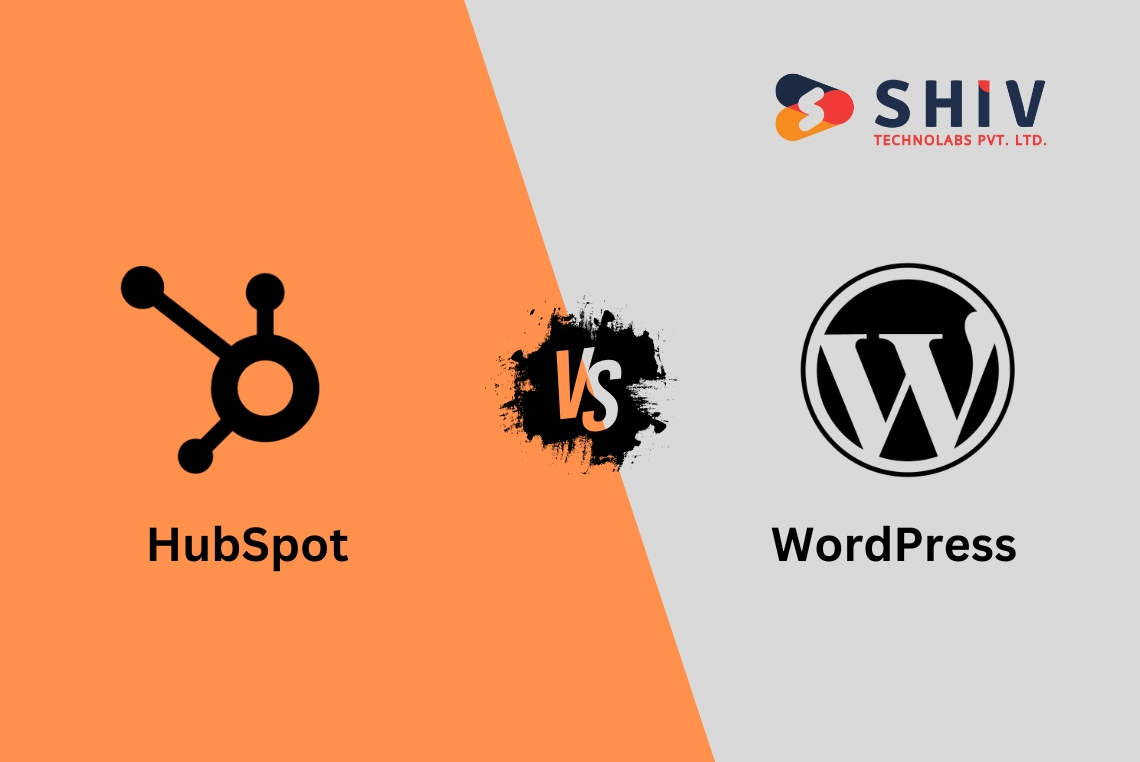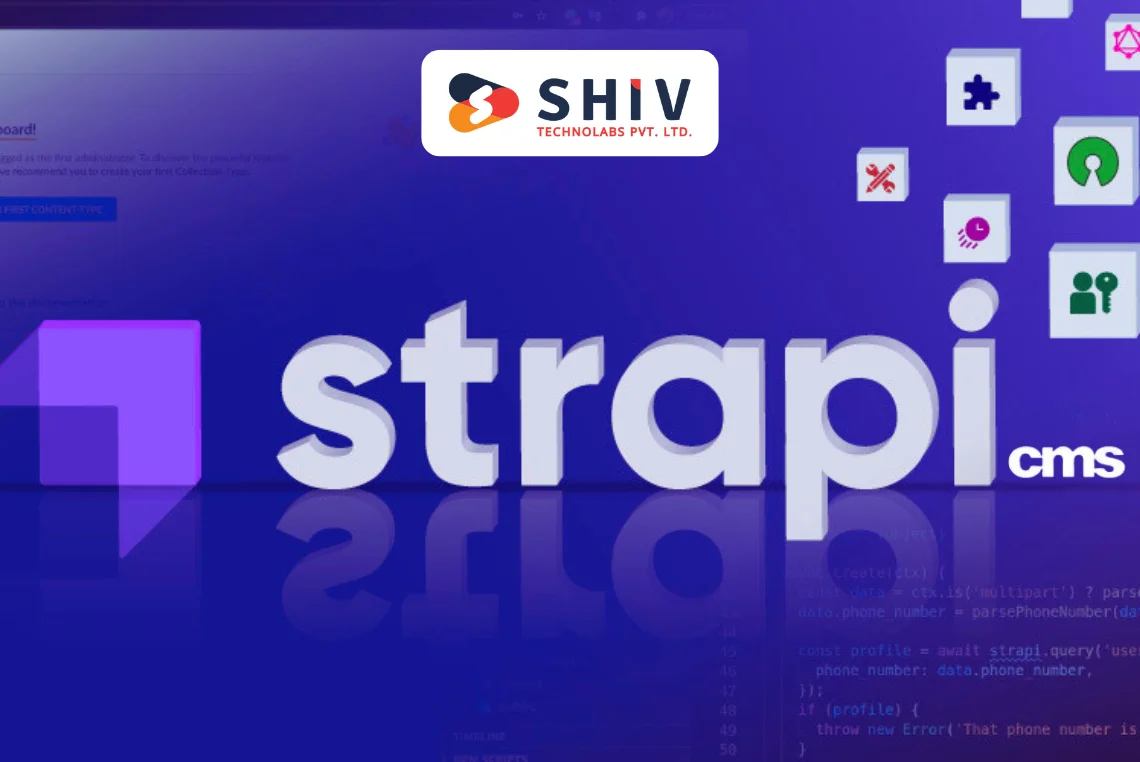Table of Contents
In the digital world choosing the right content management system (CMS) is crucial for building a strong online presence. A CMS platform is not only used for your website design but also for its functionality and overall performance. There are many popular CMS frameworks available in the market nowadays including, HubSpot, WordPress, WooCommerce, and many more.
With nearly 43% of all websites globally powered by WordPress (W3Techs, 2024) and HubSpot CMS gaining traction in B2B sectors, with 65% of users leveraging CRM integration (BuiltWith, 2024), these two platforms dominate the market. Each platform offers unique advantages that cater to different business needs. In this article, we will understand in-depth comparisons and differences between the two main CMS platforms, HubSpot and WordPress that help you to determine which platform suits your business needs.
Before delving deep into the comparison let’s start with understanding the basics of the HubSpot cms platform and WordPress cms platform.
What is HubSpot CMS?

HubSpot CMS is an all-in-one platform that integrates website management with tools for marketing, sales, and customer relationships. Businesses frequently employ the use of HubSpot customization services in building sites that streamline their operations while staying visually appealing.
# Key Features of HubSpot CMS
- Intuitive editor for quick content updates.
- Inbuilt analytics, marketing, and customer relationship management tools.
- Enterprise-grade hosting services with high uptime reliability.
HubSpot CMS focuses on businesses that need an all-in-one solution without managing multiple tools or services separately.
What is WordPress?

WordPress is a popular open-source platform known for its flexibility and scalability. It powers a major percentage of websites worldwide: from small blogs to large enterprise sites. For businesses, custom WordPress website development services ensure tailored solutions with unique features.
# Key Features of WordPress
- Thousands of free and premium WordPress themes and plugins to extend functionality.
- Flexibility for custom coding and integrations.
- Wide adoption and a thriving community that fosters innovation.
WordPress is suitable for businesses that need a website that can scale with their needs, whether for blogging, corporate branding, or eCommerce.
Pros and Cons of HubSpot CMS and WordPress Platform
Both HubSpot CMS and WordPress have advantages that make them appealing for specific business needs. However, each comes with limitations that businesses must consider.
# Advantages of HubSpot CMS Platform
1. Integrated Tools for Efficiency: HubSpot CMS contains marketing, sales, and CRM tools, which makes it best suited for streamlined operations.
2. User-Friendly Interface: Non-technical users can easily manage content and campaigns without requiring additional software or expertise.
3. Predictable Costs: Hosting, security, and features are bundled into subscription pricing, removing unexpected expenses.
4. Reliable Support: Dedicated help through HubSpot development and customization services ensures that businesses always have guidance.
# Disadvantages of HubSpot CMS Platform
1. Higher Subscription Fees: HubSpot CMS’s monthly pricing can be costly for startups or small businesses with limited budgets.
2. Limited Customization: While its templates are well-designed, they lack the flexibility needed for advanced functionality.
3. Focus on Mid-Sized Needs: Larger enterprises or niche industries may require more advanced capabilities that HubSpot doesn’t provide.
# Advantages of WordPress Platform
1. Unmatched Customization: The platform allows businesses to build unique websites using custom WordPress website design services.
2. Cost-Effective Starting Point: While the platform itself is free, businesses can scale costs based on their needs.
3. eCommerce Versatility: Plugins like WooCommerce make WordPress ideal for eCommerce website development, including advanced inventory management.
4. Global Community Support: WordPress users benefit from extensive forums, documentation, and third-party developer resources.
# Disadvantages of WordPress Platform
1. Technical Expertise Required: Advanced customization often requires coding skills or external help, adding to long-term costs.
2. Security Risks: WordPress websites depend on third-party plugins, which can introduce vulnerabilities if not maintained properly.
3. Ongoing Maintenance: Updates to themes, plugins, and core WordPress software require ongoing checking.
HubSpot CMS vs. WordPress: Key Differences
Let’s explore in-depth key differences between HubSpot and WordPress in multiple important aspects that would matter for any business:
| Aspect | HubSpot CMS | WordPress CMS |
|---|---|---|
| Platform Type | A fully managed, all-in-one platform designed for seamless integration with marketing and CRM tools. | An open-source CMS offering unmatched flexibility for building any type of website, from simple blogs to complex eCommerce sites. |
| Ease of Use | Beginner-friendly with an intuitive drag-and-drop editor, making it ideal for non-technical users. | Requires some technical knowledge, especially for advanced features. Beginners can rely on plugins for basic tasks. |
| Customization | Limited customization options compared to WordPress. Suitable for businesses focusing on streamlined templates. | Highly customizable with WordPress themes and plugins, enabling unique designs and functionality. |
| SEO Capabilities | Built-in SEO features simplify optimization tasks like keyword tracking and meta descriptions. | Offers robust SEO capabilities through plugins like Yoast SEO, allowing granular control over optimization. |
| Integrations | Integrates seamlessly with HubSpot’s marketing, sales, and customer service tools, creating a unified ecosystem. | Offers integrations with thousands of third-party tools via plugins, providing flexibility but requiring management to avoid compatibility issues. |
| Cost and Pricing | Subscription-based pricing starts at $23/month, including hosting, security, and built-in marketing tools. | The core platform is free, but costs arise from hosting premium themes, and plugins. Annual expenses typically range from $300–$500 or more. |
| Support | Dedicated customer support team with professional assistance for troubleshooting and queries. | Community-driven support through forums and documentation. Professional help is available but may require additional costs. |
| eCommerce Features | Limited native eCommerce functionality but supports integration with third-party eCommerce tools. | Excellent for eCommerce website development with plugins like WooCommerce, offering features like payment gateways, inventory tracking, and analytics. |
| Security | Provides robust security features with automatic updates and hosting management handled by HubSpot. | Security depends on hosting and third-party plugins. Users often need additional security plugins and manual updates for safety. |
| Performance | High performance due to managed hosting and global CDN, ensuring fast load times and reliability. | Performance varies by hosting provider and site configuration. Optimization is often necessary for speed and reliability. |
| Scalability | Suitable for small to mid-sized businesses focusing on marketing and CRM. | Can scale to support websites of all sizes, including enterprise-level sites, depending on hosting and configurations. |
| Learning Curve | Simple interface with a minimal learning curve, designed for ease of use by non-technical users. | May require a steeper learning curve for beginners, especially for customization and advanced features. |
| Target Audience | Best for businesses that prioritize integrated marketing and customer management tools. | Ideal for businesses needing extensive customization, eCommerce functionality, or unique website designs. |
| Popularity | Widely adopted in the B2B sector for its integrated marketing capabilities. | Powers over 43% of websites worldwide, making it the most popular CMS globally. |
How to Decide Between HubSpot CMS and WordPress for Your Business
Choosing the right content management system (CMS) for your business can make all the difference in your online presence and overall efficiency. With HubSpot CMS and WordPress being two of the most popular platforms, knowing their differences and advantages is essential. Here’s a practical guide to help you decide which CMS is better suited for your business.
# When to Choose HubSpot CMS for Your Website
HubSpot CMS is a managed platform that allows for the ease of website management and integrates marketing, sales, and customer relationship management tools. Here’s when you can opt for HubSpot CMS for your website:
1. You Need an All-in-One Platform
- HubSpot CMS offers website management in addition to tools for marketing automation, lead tracking, and analytics.
- If you want everything under one dashboard, then this platform is a perfect fit for you.
- Example: A B2B company that relies on HubSpot’s CRM for tracking leads and managing email campaigns can streamline operations by integrating the CMS.
2. Your Business Prioritizes Marketing Integration
- The platform integrates well with HubSpot’s marketing tools, which include email marketing, content scheduling, and social media management.
- HubSpot CMS development services will be helpful for businesses that are looking for a CMS that supports inbound marketing strategies.
3. You Lack Technical Expertise
- HubSpot CMS is a non-technical user-friendly platform. Its drag-and-drop editor allows you to make changes without coding knowledge.
- Small businesses without in-house developers can easily manage their websites.
4. You Want Built-In Security and Hosting
- HubSpot CMS provides hosting, security updates, and backups in its subscription.
- If you prefer a platform where these elements are handled for you, this CMS is a good fit.
5. You Have a Mid-Sized Budget
- HubSpot CMS operates on a subscription model, starting at $23/month. It is not the cheapest option, but the bundled tools can save money for businesses already using HubSpot’s ecosystem.
# When to Choose WordPress for Your Business Website
WordPress is an open-source CMS built for flexibility and scale. It’s suitable for companies requiring customized solutions or total control over their sites. Here’s when WordPress is the right option:
1. You Need Extensive Customization
- WordPress supports thousands of themes and plugins, which means that you can have a highly customized design and functionality.
- If you want a unique website tailored to your brand, custom WordPress website design services can deliver exactly that.
2. You Require eCommerce Features
- WordPress is great at eCommerce through plugins like WooCommerce.
- This platform is ideal for developing eCommerce websites with features such as inventory management, payment gateways, and analytics.
3. You Have In-House Technical Resources
- WordPress allows developers to build custom themes and plugins.
- If you have a technical team, you can take advantage of WordPress’s flexibility to create a unique, high-performing site.
4. You’re Looking for Cost-Effective Options
- The WordPress core software is free, and you can start with minimal costs for hosting and plugins.
- For businesses with limited budgets, WordPress provides affordable solutions while allowing you to scale later.
5. You Need Scalability
- WordPress can handle sites of all sizes, from the smallest of blogs to enterprise-level platforms.
- WordPress can scale smoothly depending on a good hosting provider and your needs.
6. You Prioritize SEO Control
- WordPress provides advanced SEO tools through plugins like Yoast and RankMath.
- If you want granular control over meta tags, schema, and content optimization, WordPress is a strong choice.
Choosing between HubSpot CMS and WordPress depends on your business’s goals, technical resources, and budget.
- HubSpot CMS is perfect for businesses that prioritize integration with marketing tools, require a managed platform, and lack technical expertise.
- WordPress is perfect for business owners who require flexibility, customization, or a strong eCommerce solution.
For personalized advice, consult professionals offering HubSpot solutions or custom WordPress website design services to ensure your website aligns with your business goals.
Why Choose Shiv Technolabs for Your HubSpot Development Needs?
At Shiv Technolabs, we don’t just build websites; we create experiences tailored to your business needs. Our HubSpot development services are designed to meet the different needs of every business, and this ensures a beautiful and functional piece of work for you.
- Expertise: Our team has deep experience in creating scalable and result-driven HubSpot solutions.
- Integration Focus: Seamless integration with your marketing tools ensures a unified business workflow.
- Performance-Driven Approach: We ensure your website loads faster, attracts more leads, and engages the user.
We have a proven track record with an innovative approach, and you can rely on Shiv Technolabs to unlock HubSpot’s true potential.
Conclusion
Both platforms serve distinct purposes. HubSpot CMS is exceptional for providing a managed experience to small and mid-sized businesses. The built-in marketing and CRM tools help businesses streamline operations. WordPress is perfect for businesses requiring full control over design and functionality. It’s particularly effective in eCommerce website development and businesses that are looking for unique, scalable solutions.
Still unsure which platform suits your needs? Shiv Technolabs can help. We specialize in both HubSpot solutions and WordPress development. Contact us now for a consultation and discover how we can elevate your online presence with our HubSpot solutions!




















